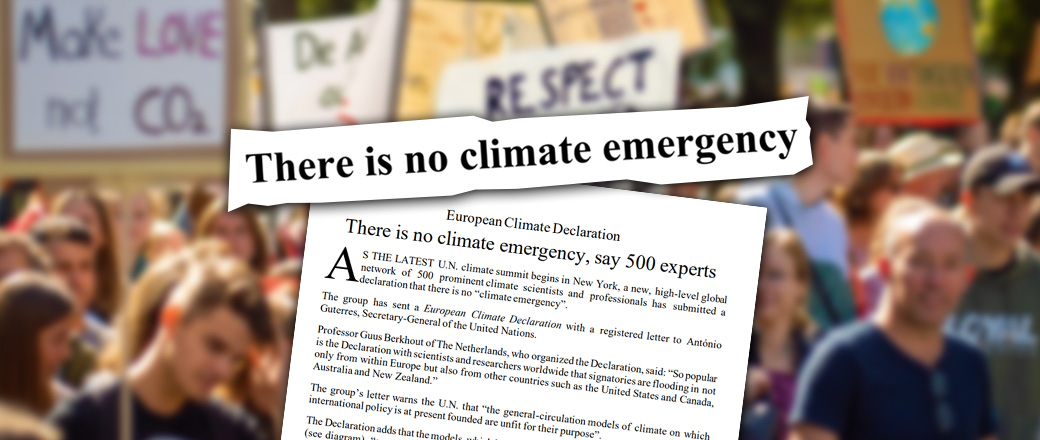On the same day that Greta Thunberg gave her impassioned speech to the UN, a group of more than 500 prominent climate scientists and professionals submitted a letter to the Secretary-General of the United Nations, stating “there is no climate emergency, and therefore, no cause for panic and alarm.”
The group, led by Professor Guus Berkhout, co-founder of the Climate Intelligence Foundation (CLINTEL) sent the European Climate Declaration along with a registered letter to the UN’s António Guterres, warning the “general-circulation models of climate on which international policy is at present founded are unfit for their purpose,” and “therefore, it is cruel as well as imprudent to advocate the squandering of trillions of dollars on the basis of results from such immature models.”
The letter goes on to warn, the “current climate policies pointlessly and grievously undermine the economic system, putting lives at risk in countries denied access to affordable, reliable electrical energy.”
The Secretary-General was then urged to “follow a climate policy based on sound science, realistic economics and genuine concern for those harmed by costly but unnecessary attempts at mitigation.”
In the letter, which can be viewed here, it’s argued:
Natural as well as anthropogenic factors cause warming
The geological archive reveals that Earth’s climate has varied as long as the planet has existed, with natural cold and warm phases. The Little Ice Age ended as recently as 1850. Therefore, it is no surprise that we now are experiencing a period of warming.Warming is far slower than predicted
The world has warmed at less than half the originally-predicted rate, and at less than half the rate to be expected on the basis of net anthropogenic forcing and radiative imbalance. It tells us that we are far from understanding climate change.Climate policy relies on inadequate models
Climate models have many shortcomings and are not remotely plausible as policy tools. Moreover, they most likely exaggerate the effect of greenhouse gases such as CO2. In addition, they ignore the fact that enriching the atmosphere with CO2 is beneficial.CO2 is plant food, the basis of all life on Earth
CO2 is not a pollutant. It is essential to all life on Earth. Photosynthesis is a blessing. More CO2 is beneficial for nature, greening the Earth: additional CO2 in the air has promoted growth in global plant biomass. It is also good for agriculture, increasing the yields of crops worldwide.Global warming has not increased natural disasters
There is no statistical evidence that global warming is intensifying hurricanes, floods, droughts and suchlike natural disasters, or making them more frequent. However, CO2-mitigation measures are as damaging as they are costly. For instance, wind turbines kill birds and bats, and palm-oil plantations destroy the biodiversity of the rainforests.Climate policy must respect scientific and economic realities
There is no climate emergency. Therefore, there is no cause for panic and alarm. We strongly oppose the harmful and unrealistic net-zero CO2 policy proposed for 2050. If better approaches emerge, we will have ample time to reflect and adapt. The aim of international policy should be to provide reliable and affordable energy at all times, and throughout the world.
A CLINTEL press release states: “The Declaration adds that the models, which have predicted far more warming than they should ‘are not remotely plausible as policy tools’, in that ‘they… exaggerate the effect of greenhouse gases such as CO2’ and ‘ignore the fact that enriching the atmosphere with CO2 is beneficial.’”
Professor Berkhout said the Declaration is so popular with scientists and researchers worldwide that “signatories are flooding in, not only from within Europe, but also from other countries such as the United States and Canada, Australia and New Zealand.”
The group has invited the Secretary-General to work with the global network to organize a constructive, high-level meeting between world-class scientists on both sides of the climate debate early next year.



















